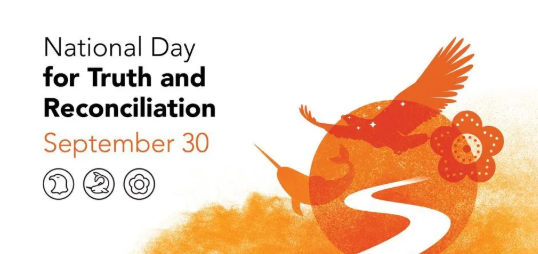On September 30th, YWCA Peterborough Haliburton will set up a booth at Nogojiwanong Friendship Centre’s event for The National Day for Truth & Reconciliation

The National Day for Truth and Reconciliation responds to Call to Action 80 from the Truth and Reconciliation Commission of Canada: “We call upon the federal government, in collaboration with Aboriginal peoples, to establish, as a statutory holiday, a National Day for Truth and Reconciliation to honour Survivors, their families, and communities, and ensure that public commemoration of the history and legacy of residential schools remains a vital component of the reconciliation process.”
This year, YWCA Peterborough Haliburton will be at Nogojiwanong Friendship Centre’s event, where we will have a booth with interactive activities and resources. While we celebrate the progress that has been made, The National Day for Truth and Reconciliation should be a day for reflection.
Our Commitment to Justice and Reconciliation
“Without truth, justice, and healing, there can be no genuine reconciliation.”
— The Final Report of the Truth and Reconciliation Commission of Canada
In 2023, YWCA Peterborough Haliburton launched its 2023–2028 Strategic Plan, affirming our responsibility to address the ongoing impacts of settler colonialism on the lands and peoples of the First Nations in this region.
This strategic direction aligns with YWCA Canada’s national commitment to reconciliation and Indigenous women’s leadership. We acknowledge historical injustices and take meaningful actions toward healing and reconciliation, guided by the Truth and Reconciliation Commission’s (TRC’s) Calls to Action.
Understanding Our History
In the 1980s, Survivors of residential schools began suing the government, with the landmark Blackwater v. Plint case leading to the 2007 Indian Residential Schools Settlement Agreement and the creation of the TRC. Over six years, the TRC collected testimony from Survivors, documenting the devastating and ongoing impacts of the residential school system. Its 2015 final report issued 94 Calls to Action, aimed at truth-telling, healing, and dismantling systemic racism to improve life for Indigenous Peoples and ensure such harms are never repeated.
Truth-telling begins with recognizing Nogojiwanong, “the place at the end of the rapids,” the name the Michi Saagiig Nishnaabeg have always used and continue to use. In the 1820s, however, the area was renamed Peterborough after Peter Robinson, a colonial official who brought Irish settlers to the region. Renaming land in this way was a common method of linguistic and cultural erasure in colonial settlement.
Colonization is often framed broadly, but its effects were experienced differently in every place and by every community. In Nogojiwanong, urban expansion and civic planning, led by figures like multiple-term mayor James Stevenson, displaced Indigenous peoples and transformed natural sites such as the Odenabe/Otonabee River and the Trent-Severn Waterway, flooding sacred areas and destroying traditional resources.
Recognizing Our Past
In 1967, YWCA Peterborough Haliburton purchased Stevenson Hall, named after James Stevenson. Sir John A. MacDonald was a frequent visitor, as Stevenson was twice elected MP for Peterborough West. The building remains our main office and serves as a poignant reminder of the YWCA’s historical role in colonial systems. Research commissioned by YWCA Canada reveals that, although the organization did not operate residential schools or hospitals, it contributed to assimilationist policies through its housing, education, vocational training, and domestic work programs. These initiatives imposed European, Christian, and middle-class norms that limited culturally inclusive opportunities for Indigenous women.
Recognizing these historical realities and the enduring impact of colonization, YWCA Peterborough Haliburton is committed to taking concrete steps that align with the TRC’s 94 Calls to Action, to ensure that reconciliation is not just a principle but a practice.
Current Actions Aligned with TRC Calls to Action
- YWCA’s Practice Framework acknowledges the organization’s historical roots in settler colonialism and expresses a commitment to behaviors, attitudes, and practices that support Indigenous women and communities. At the national level, YWCA Canada’s Leadership & Learning Hub provides resources on Truth & Reconciliation Practices to support local integration of reconciliation into operations and advocacy.
- YWCA partners with local entities (Peterborough Public Library, Niijkiwendidaa Anishnaabekwewag Services Circle, Nogojiwanong Friendship Centre) to host interactive community art installations. Community members contribute red fabric, yarn, and materials to create a collective red dress, symbolizing remembrance and solidarity for MMIWG2S+ individuals.
Lessons Learned and Pathways Forward
While we have made meaningful progress, reconciliation is an ongoing journey that requires transparency and accountability. To continue strengthening our work, we have identified several key areas for future focus:
- Provide Indigenous-specific cultural competency training for all staff, especially those working in shelters.
- Develop culturally safe housing and shelter programs for Indigenous women and families.
- Centre Indigenous voices and knowledge systems in organizational learning, programming, and decision-making.
- Expand training and leadership opportunities for Indigenous women within the organization.
- Advocate for policy change on issues affecting Indigenous women and families.
- Strengthen partnerships with Indigenous-led organizations, businesses, and community groups.
- Integrate TRC learning and UNDRIP principles into organizational policies and practices.
- Establish robust metrics to evaluate progress on reconciliation initiatives and culturally safe services.
By acknowledging our history and taking deliberate action today, YWCA Peterborough Haliburton seeks to uphold the TRC’s principles of truth, justice, and healing. Reconciliation is an ongoing journey, and we remain committed to learning, growing, and working alongside Indigenous communities to honor their knowledge and leadership, dismantle systemic inequities, and support the well-being and empowerment of Indigenous women and families.
